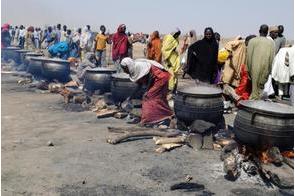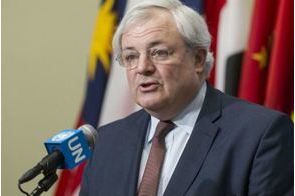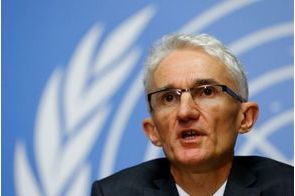Nigeria’s north-east communities to receive $13 million UN humanitarian support

Summary
The UN CERF will support the provision of food, special child nutritional supplements, protection and health services.
United Nations Under-Secretary-General for Humanitarian Affairs and Emergency Relief Coordinator, Stephen O’Brien, has released $13 million from the Central Emergency Response Fund (CERF) to provide life-saving assistance to 250,000 people in areas of north-east Nigeria.
According to a statement by the UN Office for the Coordination of Humanitarian Affairs released on Monday, the CERF funds will support the provision of food, cash for food purchase, special child nutritional supplements, protection and health services to the most vulnerable people in newly accessible areas.
“People have experienced unspeakable suffering due to the violence perpetrated by Boko Haram. We now have better access finally, and a chance to help them,” said O’Brien. “The international community must take advantage of this opening to reach people with essential services and build on the CERF allocation to scale up the response.”
The Boko Haram crisis has caused the destruction of crops and looting of livestock, leaving many people unable to support their families. As a result, the UN said over 50,000 people need seeds and tools for the upcoming planting season and CERF funding will help them to rebuild their livelihoods. CERF funds will also enable humanitarian partners to provide critical psychosocial support and protection services to people, particularly women and girls.
CERF funds have been released through disbursements to UN agencies including Food and Agriculture Organization (FAO), United Nations Department of Safety and Security (UNDSS), United Nations Population Fund (UNFPA), United Nations Humanitarian Air Services (UNHAS), United Nations High Commission for Refugees (UNHCR), United Nations Children's Emergency Fund (UNICEF) and World Food Programme (WFP).
The UN’s Humanitarian Response Plan for Nigeria was revised upwards by $51 million in June this year to about $279 million. To date, the humanitarian plan is only 22 percent funded.
Since 2015, CERF has provided over $58 million to support life-saving assistance in response to Boko Haram-related violence. With the latest funding, CERF life-saving funding to people affected by the Boko Haram crisis rises to over $70 million.
“The humanitarian crisis in north-east Nigeria is massive and alarming: 15 million people are affected by the violence instigated by Boko Haram including 7 million people who need urgent humanitarian assistance,” said Munir Safieldin, the UN’s Acting Humanitarian Coordinator.
“Unless we scale up now, 7 to 8 children will die of severe acute malnutrition every hour; 184 children will die every day. We need resources now to scale up our current response,” added Safieldin.
Related
-
USAID approves $92 million to support humanitarian efforts in Nigeria
USAID said it has now provided over $291 million in humanitarian assistance this fiscal year.
-
UN launches $22.2 billion humanitarian appeal for 2017
UNOCHA said conflicts in Syria, Yemen, South Sudan and Nigeria are among the greatest drivers of humanitarian needs, ...
-
UN officials to visit Nigeria and Chad
The joint mission provides an opportunity to assess the coordination of UN on the ground and seek further commitments from ...










